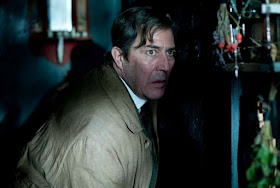 |
| Exiting the "Eel Marsh House" |
I ended last years Halloween Film Festival with an offering
from then newly-reconstituted Hammer Films and the studio has continued to
offer neat genre films for audiences jaded by torture-porn drivel, so starting things off this year with one of their recent hits seems like a winner to me. The Woman in
Black, based on Susan Hill’s 1983 novel, premiered in February 2012 starring
Daniel Radcliffe (Harry Potter) and Ciarán Hinds. Set in the early 1900s, Radcliffe
portrays Arthur Kipps, a solicitor who never recovered from the death of his
wife during childbirth, which left him with a young son (who more than reminds
Kipps of his late wife). His career has suffered to the extent that his
employer (extending him a final opportunity to prove his worth) tasks him with traveling to the coast to oversee the closeout of an
estate, the bleak and desolate Eel Marsh House. Upon his arrival, Kipps is
given a cold shoulder by the townsfolk and repeatedly encouraged to leave. Only
Sam Daily and his wife (who tragically lost their son) offer him the least
courtesy.
 |
| Hinds as "Sam Daily" |
Kipps arrives at the Eel Marsh House, which becomes completely
isolated as high tide washes over the causeway by which access is gained to the
islet upon which it sits. Arthur soon begins to hear odd noises, and sees a
woman dressed in mourning garb outside on the perimeter of the grounds. Returning
to town, Arthur reports these occurrences as two boys enter the police station
with their dying sister (she had drunk lye). The next day Kipps decides to stay
overnight at the Eel Marsh House to complete his work, over objections of the
locals. He uncovers letters from Alice Drablow, the home's recently deceased
owner, and her mentally disturbed sister Jennet Humfrye. Jennet claims that Alice had stolen her son
Nathaniel away from her, and demands to see him. In subsequent letters it is
revealed the boy drowned in the marsh, and that Jennet blamed Alice before hanging herself. Toys begin
making noise upstairs in Nathaniel's room, where Arthur witnesses the spirits
of the Woman in Black and a mud-covered Nathaniel. The next day, Arthur learns
that the deaths of local children are the work of Jennet Humfrye (as the Woman
in Black) who had cursed the town after her child was taken from her due to her
being pregnant out of wedlock. Believing that his own son Joseph (who is being
brought to the town by his nanny the next day), is a target for the Woman in
Black, Arthur decides to reunite Nathaniel and Jennet by finding Nathaniel's
body in the marsh with Sam's help (in order to break the curse).
 |
| Radicliffe as "Arthur Kipps" (and an unnoticed "Woman in Black) |
To say much more would ruin the film for anyone interested
in seeing it. Suffice to say that "bumps in the night" types of scares have become
old hat for ghost films, and only unique talent can ably elevate such fare for modern audiences. The Woman in Black succeeds admirably, with outstanding
performances from Radcliffe and Hinds, backed by an excellent supporting cast.
The proper atmosphere is maintained via moody cinematography and an exceptional
score, plus it’s always nice for theater-goers to sit through chills that the
characters onscreen aren’t fully aware of, which keeps the tension at a high
level. Top marks go to director James Watkins and Jane Goldman for her
screenplay, which breaks slightly from the premise of the original source
material. The bottom line is The Woman in Black is exactly the kind of fright flick to
watch on Halloween, and that is more than enough to satisfy the Catacombs.
Highly recommended!

I liked it, too - Good, clean fun.
ReplyDelete